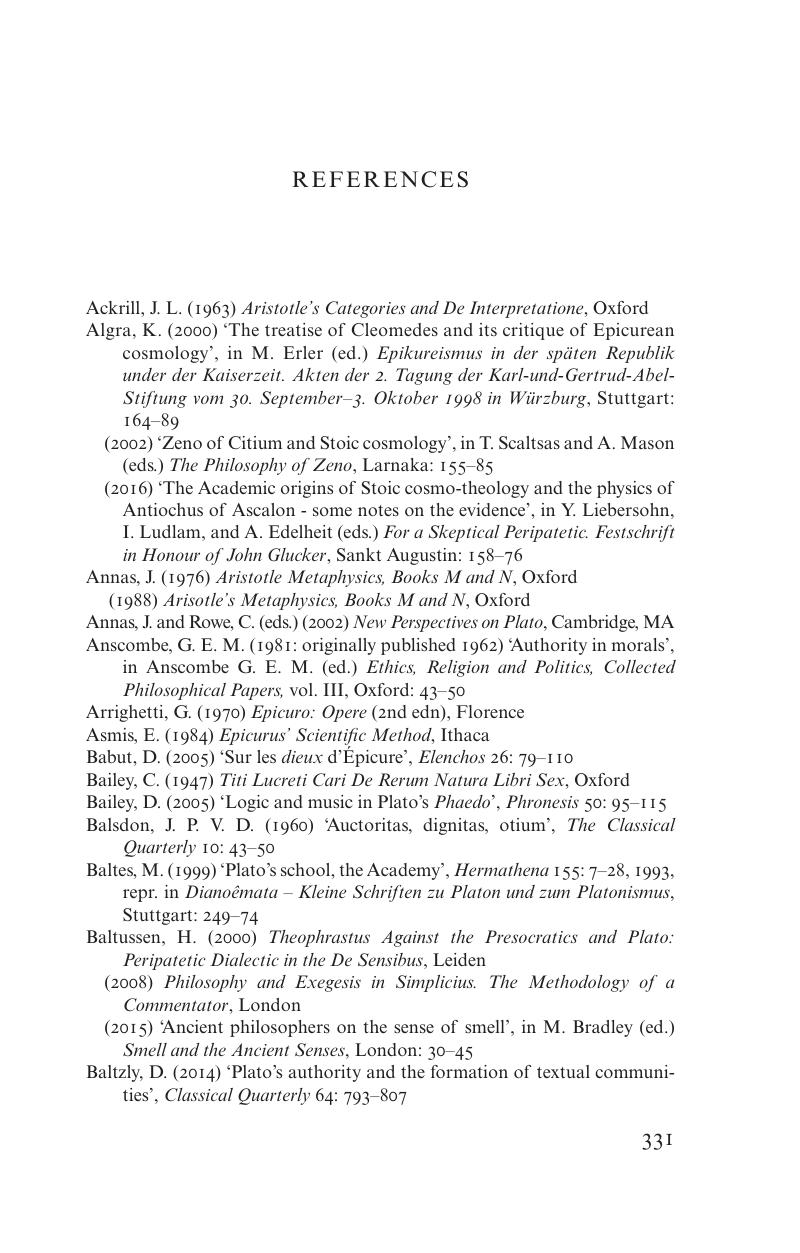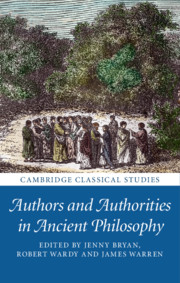Book contents
- Authors and Authorities in Ancient Philosophy
- Cambridge Classical Studies
- Frontispiece
- Authors and Authorities in Ancient Philosophy
- Copyright page
- Dedication
- Contents
- Contributors
- Abbreviations
- Introduction: Authorship and Authority in Ancient Philosophy
- Chapter 1 Reconsidering the Authority of Parmenides’ Doxa
- Chapter 2 Authority and the Dialectic of Socrates
- Chapter 3 Socratic Discussions of Death and Immortality in Plato
- Chapter 4 A Superannuated Student: Aristotle and Authority in the Academy
- Chapter 5 Words, Deeds, and Lovers of Truth in Aristotle
- Chapter 6 Aristotle’s Categories 7 Adopts Plato’s View of Relativity
- Chapter 7 Theophrastus and the Authority of the de Sensibus
- Chapter 8 Pseudo-Archytas and the Categories
- Chapter 9 Numenius on Intellect, Soul, and the Authority of Plato
- Chapter 10 Demetrius of Laconia on Epicurus On the Telos (Us. 68)
- Chapter 11 Lucretius the Madman on the Gods
- Chapter 12 In and Out of the Stoa: Diogenes Laertius on Zeno
- Chapter 13 The Emergence of Platonic and Aristotelian Authority in the First Century BCE
- Chapter 14 Cicero on Auctoritas
- Chapter 15 Authors and Authorities in Ancient China: Some Comparative Observations
- Chapter 16 Antique Authority?
- References
- Index Locorum
- General Index
- References
References
Published online by Cambridge University Press: 07 September 2018
- Authors and Authorities in Ancient Philosophy
- Cambridge Classical Studies
- Frontispiece
- Authors and Authorities in Ancient Philosophy
- Copyright page
- Dedication
- Contents
- Contributors
- Abbreviations
- Introduction: Authorship and Authority in Ancient Philosophy
- Chapter 1 Reconsidering the Authority of Parmenides’ Doxa
- Chapter 2 Authority and the Dialectic of Socrates
- Chapter 3 Socratic Discussions of Death and Immortality in Plato
- Chapter 4 A Superannuated Student: Aristotle and Authority in the Academy
- Chapter 5 Words, Deeds, and Lovers of Truth in Aristotle
- Chapter 6 Aristotle’s Categories 7 Adopts Plato’s View of Relativity
- Chapter 7 Theophrastus and the Authority of the de Sensibus
- Chapter 8 Pseudo-Archytas and the Categories
- Chapter 9 Numenius on Intellect, Soul, and the Authority of Plato
- Chapter 10 Demetrius of Laconia on Epicurus On the Telos (Us. 68)
- Chapter 11 Lucretius the Madman on the Gods
- Chapter 12 In and Out of the Stoa: Diogenes Laertius on Zeno
- Chapter 13 The Emergence of Platonic and Aristotelian Authority in the First Century BCE
- Chapter 14 Cicero on Auctoritas
- Chapter 15 Authors and Authorities in Ancient China: Some Comparative Observations
- Chapter 16 Antique Authority?
- References
- Index Locorum
- General Index
- References
Summary

- Type
- Chapter
- Information
- Authors and Authorities in Ancient Philosophy , pp. 331 - 348Publisher: Cambridge University PressPrint publication year: 2018



